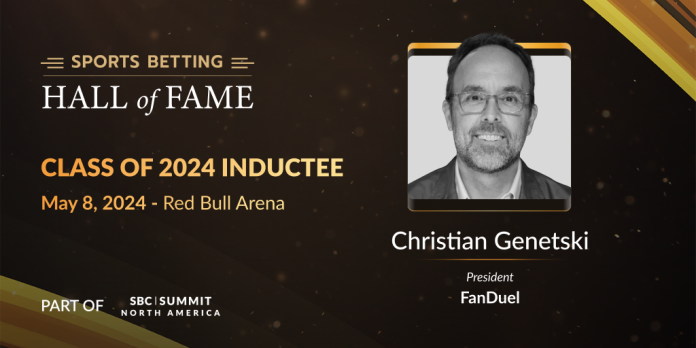The Sports Betting Hall of Fame is designed to honor individuals that have made a significant and lasting contribution to the industry, something which Class of 2024 member Christian Genetski has indisputably done.
During his decade with FanDuel as chief legal officer and now president, he has been at the forefront of a government affairs strategy that has succeeded in opening up legal online sports betting markets in multiple U.S. states.
He has also helped to ensure the survival of daily fantasy sports and establish a partnership model between operators and major leagues. At the same time, he played a pivotal role in the FanDuel – Paddy Power Betfair deal and contributed to the creation of an approach to business that has made FanDuel hugely successful.
Strategic
During any conversation about FanDuel’s rise with Genetski, he is at pains to point out that it has been a team effort. Longstanding colleagues, however, are keen to credit Genetski with developing the legal strategy that successfully thwarted existential threats and hastened the spread of regulated sports betting in multiple states across the U.S.
One crucial point in the company’s history came in 2015, when the then New York Attorney General Eric Schneiderman declared daily fantasy sports illegal and stated that both FanDuel and DraftKings were, in essence, illegal gambling operations. With other states moving to impose copycat bans, the situation looked bleak.
The news did not come completely out of the blue for Genetski though and he had already begun the groundwork for a campaign to protect the future of the industry.
“It was never a thought that we were just going to sail by unregulated forever,” he explained. “So before the troubles started for DFS, we hired lobbyists in states where we were going to make an affirmative push and we were preparing for that.
“But the analogy I used years ago was, we were winterizing our home on the coast for a Category Two, and we got a Category Five. So we had to double down a bit, as we weren’t quite as prepared as we thought we were.”
This is where Genetski’s expertise really paid off for FanDuel. First up was a lawsuit that allowed the DFS operators to continue working in New York until the state’s Supreme Court made a final ruling. Then came the crucial strategic decision to target legislatures, rather than rely on winning court cases.
As a result of the subsequent campaigning, the New York Assembly passed legislation that made DFS legal in the summer of 2016. Virginia had already made the same decision and multiple other states soon followed suit, ensuring the survival of both FanDuel and DraftKings.
Recalling that time, Genetski said that attorneys general who questioned the legality of DFS were keen for legislatures to clarify its status because existing laws, some of which dated back more than 60 years, were unclear. That provided an opportunity to, with the help of skilled lobbyists, educate legislators on what DFS was and why it should be allowed to operate within a regulated framework.
That education process was a success for DFS and informed the strategy Genetski pursued post-PASPA repeal.
“We had less education to do with sports betting because the Supreme Court case was so high profile,” he explained. “You had New Jersey, Pennsylvania, who had passed laws in waiting. You had West Virginia which passed one sort of immediately. So there was a little bit of organic movement from the legislators themselves in the very first early states.”
“From there, the story was pretty straightforward. Every legislator knew plenty of people who were betting on sports. It’s not that this was not happening, and here was a way to immediately convert the illegal market to a legal regulated market where consumers would have recourse if something went wrong and the state would get the tax benefits.”
While Genetski may characterize the process as “straightforward”, there have been plenty of knockbacks along the way and it has taken multiple attempts to pass legislation in some states – a process he describes as being “like getting elected to the Baseball Hall of Fame”. Perseverance is only part of that equation though.
“People often ask ‘what is FanDuel’s guiding principle in its government relations work?’ My answer to that is ‘pragmatism’,” Genetski explained.
“We want to expand the addressable market and, as long as it’s being expanded in a way where we think we can compete fairly on a level playing field and grow our business, then we’re not going to let perfect be the enemy of the good in an outcome that does that.
“Others in the space may characterize us as being impatient and they may be more comfortable waiting out for a more perfect scenario, whereas we’ll take something that’s 90% there and that we can get now.”
Fast learner
The story of FanDuel’s rise to its current position as market leader is an unusual one. Few companies are ever in a situation in which they face two major, but similar, challenges in such quick succession as the operator did when it had to campaign for the legalization of DFS and then sports betting.
Learning from your failures is a key quality for any resilient executive, but in some circumstances learning from your successes is equally important. That certainly proved to be the case for Genetski as he set out to tackle the task of persuading state legislatures to establish regulated betting markets.
“I was the tip of the spear for handling all of the external legal challenges, the government affairs work, managing our partners and helping them, convincing them to stand by us and wait to see what happened on the other side,” he explained.
“Some of the lessons I learned had very practical applications. We passed 20-something DFS laws in different states, so when it was time to push for sports betting legalization, it was telling the same committees, ‘hey, we’re back. You’re familiar with our lobbyists, you’re familiar with the idea and this is much more revenue’. We really were able to leverage the lobbying infrastructure we’d built.”
In addition to how to formulate a lobbying strategy, the DFS-first era taught Genetski how to handle difficult conversations with partners and regulators, and how to work in a regulated environment. It also provided invaluable lessons about growing the business.
“As a daily fantasy company we learned how to market a B2C business to customers who wanted to play for money around sports and figured out how you really develop a digital marketing machine and an online-first consumer business,” Genetski said.
“That was really critical because it just wasn’t something that a lot of the competitive set that we would be facing when we got to 2018 and beyond in sports betting was doing from 2014 to 2018. We made a ton of mistakes, but those mistakes were very helpful when we got to part two.”
A further crucial learning from that tough period when the future of DFS was in doubt, was the importance of having the right mentality.
“What I think is underrated – and I think applies both to FanDuel and our closest competitor – is we entered 2018 with a real will to win because we had been at death’s door as a business multiple times and kept picking ourselves up off the mat and living to fight another day,” said Genetski.
“When that’s the arc of your experience and you suddenly have what looks like an actual opportunity to take off, as opposed to just stave off your demise, the energy to run at that opportunity is incredibly high.
“The online sports betting opportunity was everything for FanDuel, which is very different from a large company that’s spitting out tons of EBITDA in a pretty stable environment that is going to try a new vertical and see how it goes. For us, this was the whole game. That singular focus and will to win was very important and those were things that were cultivated in part one.”
Balanced
Corporate history is littered with Icarus-style failures, when leaders failed to temper their natural ambition with a healthy dose of realism. When the Supreme Court decision on PASPA in May 2018 finally created a path to a multi-billion dollar legal sports betting industry, it also created the potential for strategies dictated by over-excitement rather than long-term thinking.
Not at FanDuel though, where Genetski and the rest of the leadership team took a more cautious approach. Rather than assume that the brand’s strong position in the DFS space would translate directly into sports betting success, decisions were taken in the belief that the company would find it tough to compete against established gambling corporations such as Caesars and MGM.
“Looking back on my 2018 thinking and the specific decisions we made at the time, my main takeaway was that we weren’t nearly ambitious enough,” said Genetski.
“It sounds odd because we’re number one now. So you would say, ‘well, we must have done everything right’. In fact, I think we made a lot of decisions that, knowing what we know now, we would do the complete opposite.”
He added that his initial expectation of the New Jersey market launch was that FanDuel and DraftKings would settle somewhere in the range of third to sixth in the market, alongside the big casino operators.
With the advantage of hindsight, that seems to be a remarkably timid ambition. But with long-term profitability now in view for FanDuel, it is clear that being less bullish than some of the competition in the early days of the market was the correct decision.
“FanDuel has a pretty risk-averse, conservative mindset. Flutter is very similar to that, too. So partly, maybe we were managing our own expectations,” Genetski concluded.
“But I can tell you for sure that nobody foresaw where we are now, five years later. That it’s FanDuel and DraftKings, and then a big drop-off, I don’t think that was what any of us anticipated.”
Resilient
Every successful business has endured tough times and FanDuel is no exception. In 2017, with legal sports betting on the horizon but still tantalizingly out of reach, the company found itself in a situation that threatened its existence.
“After the DraftKings merger was blocked by the FTC in August of 2017, FanDuel was pretty much out of money,” recalled Genetski. “So we had to immediately do an internal capital raise to keep the lights on and take in just enough money to say, ‘we’ve gotta sell the company, merge the company, or find a path to a much bigger capital infusion in the next nine months’.”
At that point, a team consisting of Genetski, Matt King (who had returned to the business as CEO following the departure of Co-Founder Nigel Eccles), Andy Giancamilli (the current COO, but then CFO) and David VanEgmond (then Head of Corporate Development) set about meeting anyone who might have an interest in investing in the DFS or sports betting space.
The timing made things particularly difficult, as the Supreme Court heard oral arguments in the PASPA case in December 2017 and while there was growing optimism about legalization of sports betting in the U.S., nothing was guaranteed.
“That uncertainty made valuing FanDuel, and trying to figure out whether it was an asset or not, very difficult. At the end of the day, almost everyone passed,” said Genetski.
“I’m confident there are some companies, who shall remain nameless, who could have bought FanDuel outright for $350-400 million at the time that sure wish they had! But we were a loss-making fantasy sports business with an uncertain future. How would we ever turn it around if sports betting didn’t pass? And we didn’t even have any sports betting infrastructure.”
At this point, the leadership team pursued a dual strategy. They spent time talking to suppliers about buying in a third-party sportsbook solution – an approach Genetski admits would have left FanDuel unable to launch alongside the competition in September 2018 – while continuing to seek partners to acquire the business.
The tactic of speaking to anyone and everyone while they searched for the right investment paid off when the team talked to Paddy Power Betfair.
“After we met with the Paddy Power Betfair guys, we said, ‘this feels like a good cultural fit’. It really did, from the beginning, feel like a good match,” said Genetski. “They already had a business in the U.S., TVG, so there were people from their company already over here and we felt it was really a good complementary business.
“We did a unique deal with sliding valuations, depending on whether PASPA was repealed or not, because it was just an unknown. We signed the deal before the [Supreme Court] decision came down and closed after.
“The companies both quantified and shared the risk and the upside in getting the deal done, and ultimately got something that worked for us and gave us a chance to have another go at it.”
The merger of FanDuel and Paddy Power Betfair’s U.S. business closed in July 2018 and left the company ideally placed to take advantage of the sports betting opportunity. Now, under the ownership of the rebranded $36.3 billion Flutter Entertainment powerhouse, FanDuel has done exactly that.
Ethical
A successful business needs a healthy, ethical culture and Genetski has played an integral role in the creation and evolution of FanDuel’s guiding values. While for many companies, brand values are little more than a marketing tool, the ten FanDuel Principles are an integral part of its approach to doing business.
“Sometimes you hang them on the wall and nobody ever talks about them again, but for whatever reason, these have really stuck and they’ve been really helpful to us during a period of immense growth,” said Genetski.
“We embrace these principles in the interview process. They’re part of the annual review process. We talk about them, people use them in emails, we use them in town halls, we do illustrative examples of people living the principles.”
One of those people very definitely living the principles is the President himself.
“The one that, for me, captures the gestalt of FanDuel’s culture, is stay humble, stay hungry. It was very easy to stay humble several years ago. It’s harder to stay humble when you’re in the position we are now, but I think we’re pretty good at it,” he said.
“When we talk about being humble, it is not about our ambitions. We should be voracious in our ambitions, but humble about our ability to execute and what we still don’t know and what we can still learn. But we’re really hungry to chase the big ambition and hungry to learn.”
“The other one I think is really important to us is win with integrity. We pride ourselves on being professional with everyone we interact with, being respectful, being transparent, being honest, whether it’s our customers, our partners or potential partners,” Genetski continued.
Collaborative
“In any company, there are going to be difficult decisions to make. We often voice that a particular decision is commercially going to be disadvantageous, but we win with integrity and this is the right decision to make.”
The battle to secure legal status for first DFS and then sports betting was not one that operators could win alone. They needed high-profile supporters and FanDuel found one in the form of the NBA.
Genetski was in talks about joining FanDuel in 2014 when he heard that the NBA was poised to take an equity stake in the company. “I think for me was the sort of legitimising stamp of approval from the institutional sports space that was critical to my saying ‘yes’ and that I want to go for it,” he recalled.
While he may not have instigated the relationship, Genetski recognized how important it could be and has since played a significant role in strengthening it. The two organizations continue to work together to this day.
Key to his realization of how crucial NBA support could be came shortly after he had joined FanDuel, when Commissioner Adam Silver penned a New York Times op-ed about the benefits of legalizing sports betting.
“I did not know it was coming, but I do think that was a very powerful, seminal moment. Whatever quiet conversations the other leagues were having, he said the quiet part out loud and, very intentionally, pointed out that this is not going away – it’s only going to get bigger,” Genetski said.
By the time the Supreme Court took cert in the PASPA case, Genetski detected that the position of the leagues had definitively changed and that they had begun to prepare to benefit from the potential arrival of legal sports betting in multiple states. From there he honed a collaborative approach that harnessed the influence of the NBA and the other leagues, but also recognized that operators would have to help the sports organizations to have a stake in the industry.
The first step was to introduce the leagues to FanDuel’s national lobbyists and waive any conflicts, thereby giving the leagues representation in ongoing conversations about legalization and ensuring their issues were part of the discussions.
“That was a calculation by FanDuel and by DraftKings both that the leagues stood by us in the fantasy days when we had a lot of troubles,” Genetski explained. “MLB stood by DraftKings, NBA stood by FanDuel. The NFL was actually quite supportive, even though we didn’t have formal partnerships with them.
“We felt that they had paid forward and earned the right to stay close and be partners. So we made the decision then, I think both companies independently, that we wanted to be close to the leagues.”
“We felt it would accelerate states passing the laws if the leagues were there and supportive and buying in. I do think it was quite critical, particularly in the first couple of years, to have the leagues on record as being supportive.”
“And so we continue today, we’re official partners with the NFL, the NBA, MLB, the PGA Tour and NASCAR. I think that’s how we’re going to continue to operate as a business.”
Genetski still gets a buzz from working with the leagues on decisions that will influence the future of the industry, and from seeing the FanDuel brand in stadiums and arenas. That enjoyment is not solely derived from a company perspective though.
“Ultimately, when I think about legacy – and I have daughters who are 10 and 12, who know what I do – whatever sports betting in the U.S. becomes, I’m gonna have been very pivotal in that happening. So, it’s really important for me that it sits in the mainstream of sports, that it’s considered additive and fun, and it’s contextualized in the right way in the overall discussion about sports.”














